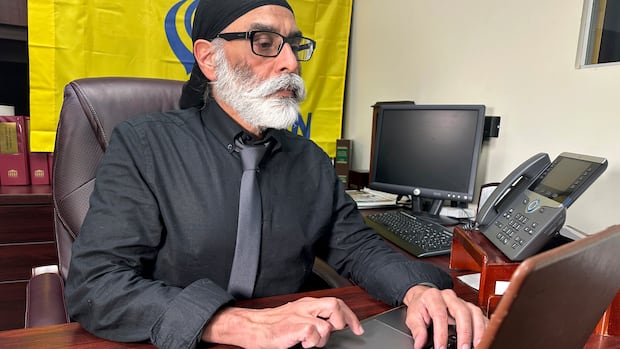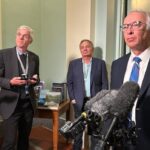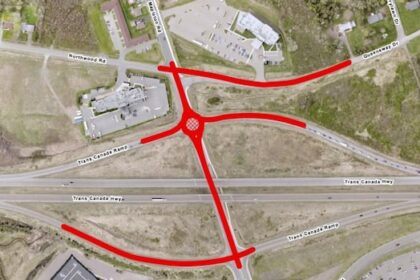PoliticsU.S. prosecutors in Manhattan plan to introduce evidence in a trial that sheds new light on the 2023 killing of Hardeep Singh Nijjar in British Columbia — and the alleged role of the Indian government in arranging the hit.Prosecutors ask to enter evidence of India’s role in death of Hardeep Singh NijjarEvan Dyer · CBC News · Posted: Oct 09, 2025 5:43 PM EDT | Last Updated: 6 hours agoSikh separatist leader Gurpatwant Singh Pannun was the target of an alleged murder plot in 2023. U.S. authorities say an Indian government official directed the plot to assassinate Pannun in New York City. (Ted Shaffrey/The Associated Press)U.S. prosecutors in Manhattan plan to introduce evidence in a trial that sheds new light on the 2023 killing of Hardeep Singh Nijjar in British Columbia — and the alleged role of the Indian government in arranging the hit.The evidence will be presented in the trial of alleged drug and firearms trafficker Nikhil (Nick) Gupta, accused of co-ordinating a murder-for-hire plot to kill Sikh activist Gurpatwant Singh Pannun.If the evidence is admitted, it could prove awkward for India as Ottawa and New Delhi attempt to re-establish normal diplomatic and trading relations.Gupta is accused of working with an officer of India’s spy agency, the Research and Analysis Wing (R&AW), named Vikash Yadav. The two allegedly sought to assassinate Pannun, the founder and leader of the group Sikhs For Justice and organizer of a worldwide campaign for an independent Sikh homeland, and at least three other people including Nijjar, Pannun’s Canadian deputy.The 53-year-old Gupta was arrested in Czechia and extradited to the U.S. in June 2024. India considers Pannun a terrorist. The U.S. and Canada — both countries where Pannun holds citizenship — do not. Pannun says his campaign is based entirely on holding peaceful referendums throughout the Sikh diaspora.”The undercover was telling them that I’m always surrounded by people, and I’m always moving,” Pannun told CBC News. Pannun said that the filing proves the U.S. government has evidence that leaves no doubt about official Indian involvement in the plot to kill his deputy in Surrey, B.C. Four men have been charged with murder in that case.”It’s clear evidence that India’s R&AW official Yadav, and anybody working with him, directly commanded the assassination of shaheed [martyr] Nijjar,” Pannun said.Gupta has pleaded not guilty and the allegations in the filing have not been proven in court.The trial has been set to begin Nov. 3.An FBI wanted poster shows Indian intelligence agent Vikash Yadav. Once sought by U.S. authorities, Yadav is no longer expected to face trial in the U.S. (FBI)Negotiations between the Biden administration and the Modi government in October 2024 concluded with an agreement that Yadav would no longer work for the Indian government. According to reports in Indian media, the U.S. agreed not to prosecute Yadav. The agreement was an attempt by both sides to prevent the case from seriously damaging U.S.-Indian relations.By portraying Yadav as a rogue actor — a move criticized by some in India — the country was also able to prevent investigators from going higher up the chain of command. The R&AW’s then director, Samant Goel, had been implicated in initial reporting about the New York plot.Canadian investigators have told CBC News that the plot reached the very top of the Indian government.The New York court filing alleges that in addition to Pannun and Nijjar, Gupta also targeted a third individual in Nepal or Pakistan, a plot “so strikingly similar to the plot to murder [Pannun] as to constitute a modus operandi” under the law.Proof of kill videoThe government’s case against Gupta was laid out in a court filing this week, issued in response to a defence motion in limine to exclude a range of evidence against Gupta as prejudicial.U.S. Attorney for the Southern District of New York Jay Clayton argues that the evidence in question, including a still-unpublished video of the Nijjar killing, is relevant to the case and should be admitted.The Canadian public has seen some video of the Nijjar shooting that was captured by CCTV at the parking lot of the Guru Nanak Sikh Gurdwara in Surrey. But no one other than investigators, prosecutors or the alleged plotters themselves has seen the seven-second video filmed at the scene to prove that the hit had been successfully carried out.The filing says video shows Nijjar’s body after being hit by several rounds. He is slumped over the steering wheel of his truck with blood stains on his white shirt around his neck and shoulder.Prosecutors allege that Yadav received the video in the immediate aftermath of the shooting, and quickly forwarded it to Gupta, the alleged middleman between Yadav and the New York hit squad. The filing says Gupta then forwarded it to a confidential source who had introduced him to the supposed hit man, and to the “hit man” himself, who was in fact a federal agent.Wiretap indiscretionsThe prosecutor’s motion also includes, for the first time, transcripts of recorded conversations between Gupta, the confidential source identified as “CS” who first brought the alleged plot to the Drug Enforcement Administration and the undercover federal agent identified as “UC.”One of the transcripts purports to show a conversations between Gupta and UC, recorded right after Gupta allegedly forwarded the agent the video of the Nijjar killing.This transcript shows an alleged exchange between Gupta and an undercover federal agent posing as a hit man. (U.S. District Court, Southern District of New York)The filing says Gupta also forwarded the alleged murder video to CS.They also allegedly discussed a guns and narcotics smuggling scheme. Gupta had allegedly promised his New York accomplices a large shipment of assault rifles and pistols on an airplane from India if they completed the job.In this exchange, prosecutors will allege that ‘toys’ refer to arms including assault rifles and pistols, and that ‘production’ refers to narcotics. (U.S. District Court, Southern District of New York)Gupta allegedly already paid CS $15,000 as a down payment on the hit and reiterated his claim that the promised arms would not have to pass through U.S. Customs.”I will load your toys, no problem. No checking, no nothing. Your plane will come. We will put all the toys, what you want in the airplane,” the transcript reads.There is no indication in the filing how the alleged delivery would evade customs.The court filing also contains descriptions, though not transcripts, of WhatsApp conversations between Gupta and Yadav.It alleges the exchanges show that Yadav had promised Gupta that he would clear a plane and supply him with weapons once the hit was successfully carried out.Linking the Indian governmentThe court filing shows that the U.S. government intends to make its case that the Government of India was involved with the killings — and that it had motive to kill Sikh separatists. It seeks to include expert testimony from Nitasha Kaul, a professor of international relations at London’s University of Westminster “to testify about the GOI [Government of India’s] public condemnation of [Pannun], Nijjar and the Sikh separatist organization that they led (the “Group”), and about the structure, methods and mission of the GOI’s foreign intelligence service.”Nitisha Kaul of the University of Westminster in the U.K. is expected to appear as an expert witness for the U.S. government to explain why the Modi government allegedly wanted Pannun and Nijjar dead. (University of Westminster)It continues: “This testimony is highly probative of why Yadav enlisted Gupta to murder the victim … professor Kaul will testify that the GOI views the Group and its members as an ‘existential threat.'”That testimony will not be welcomed in New Delhi, where the Modi government has sought to portray the Pannun plot as an unauthorized operation by a rogue agent, and deny involvement in the Nijjar killing.Kaul has described her own experience with “transnational repression” by the Modi government. Last year the Kashmiri Hindu-origin academic was deported from the country of her birth shortly after arriving at Bengaluru Airport, in the southwestern Indian state of Karnataka.She wrote on X that on her arrival back in the U.K. she was informed she had been stripped of her right to an Indian passport for “anti-India activities.”
Court filing in U.S. murder plot trial sheds new light on killing of B.C. Sikh activist











